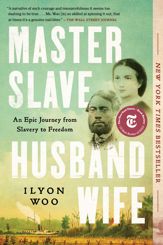"In a tightly focused narrative animated by vivid battle depictions, Mr. Reeves connects Grant’s personal and professional redemption to the country’s. Absorbing."
Description
Presenting an original, thought-provoking look at Ulysses S. Grant, Soldier of Destiny evokes the life of the general through his conflicted connection to slavery, allowing readers a clearer understanding of this great American.
Captain Ulysses S. Grant, an obscure army officer who was expelled for alcohol abuse in 1854, rose to become general-in-chief of the United States Army in 1864. What accounts for this astonishing turn-around during this extraordinary decade? Was it destiny? Or was he just an ordinary man, opportunistically benefiting from the turmoil of the Civil War to advance to the highest military rank?
Soldier of Destiny reveals that Grant always possessed the latent abilities of a skilled commander—and he was able to develop these skills out West without the overwhelming pressure faced by more senior commanders in the Eastern theater at the beginning of the Civil War. Grant was a true Westerner himself and it was his experience in the West—before and during the Civil War—that was central to his rise.
From 1861 to 1864, Grant went from being ambivalent about slavery to becoming one of the leading individuals responsible for emancipating the slaves. Before the war, he lived in a pro-slavery community near St. Louis, where there were very few outright abolitionists. During the war, he gradually realized that Emancipation was the only possible outcome of the war that would be consistent with America’s founding values and future prosperity. Soldier of Destiny tells the story of Grant’s connection to slavery in far more detail than has been done in previous biographies.
Grant’s life story is an almost inconceivable tale of redemption within the context of his fraught relationships with his antislavery father and his slaveholding wife. This narrative explores the poverty, inequality, and extraordinary vitality of the American West during a crucial time in our nation’s history. Writers on Grant have tended to overlook his St. Louis years (1854-1860), even though they are essential for understanding his later triumphs.
Walt Whitman described Grant as “a common trader, money-maker, tanner, farmer of Illinois—general for the republic, in its terrific struggle with itself, in the war of attempted secession. Nothing heroic, as the authorities put it—and yet the greatest hero. The gods, the destinies, seem to have concentrated upon him.”
Reviews
“Mr. Reeves wants us to share that intimacy to drive home how this person — not just the historical figure—began to behave in new ways.”
"Reeves’s book provides a well-written and accessible approach to this crucial decade in Grant’s life. The work focuses on many intriguing yet understudied aspects of Grant’s life, including his family relationships and antebellum career in Missouri. Few Grant biographers contend with Grant’s problematic relationship with slavery to the extent that Reeves does...readers interested in Grant’s family relationships, views on slavery, and Civil War career would do well to read Reeves’s intelligent book."
"An enlightening look at how Ulysses S. Grant benefited from slavery years before he helped end the institution. Reeves manages to stitch Grant’s flaws and virtues into a thought-provoking portrait of a key historical figure who never lost faith in himself or his country."








































































































